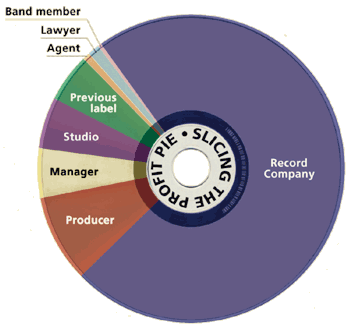
Have you heard of Demand Media? Probably not. Wired has a fascinating article about how they're using the ever-growing web population to create specific content used to answer common (and popular) queries to major search engines. Their destination site? eHow
For example, with the current disaster in Haiti, I'm sure the search engines are be deluged with questions about Haiti, including language, food, customs, etc. Demand Media is tasking their freelancers to produce short, informative video/written answers to those very questions, hoping to be in the top results for those search engine queries.
The result is a factory stamping out moneymaking content.
 They run ads along side of the content pages, and get advertising revenue from those same links. Basically, they are a hype-following content creation machine. Most content is created to fill the social demand, less for the niche demand. No one will be shooting a video about Peru's native language while the American news cycle ignores it completely. Sounds like idiocracy at work to me.
They run ads along side of the content pages, and get advertising revenue from those same links. Basically, they are a hype-following content creation machine. Most content is created to fill the social demand, less for the niche demand. No one will be shooting a video about Peru's native language while the American news cycle ignores it completely. Sounds like idiocracy at work to me.
The interesting thing is how little they pay for what used to be expensive and time consuming. The article goes to show how a filmmaker works nearly a day for a mere $20 per video. They make up for production costs by shooting as many videos at once. You can turn any activity into multiple lessons, with the same teacher, and pump out 5-10 videos in a day, but it's hard work, and the results are less than professional, and often somewhat biased, and probably not fact-checked thoroughly.
The title of this post is a 'loose' quote from Richard Rosenblatt, CEO of Demand Media, and a dot-com exec with more failures than successes under his belt. His previous bets on content and branding on the internet have failed over and over, and often were highly overvalued. He's certainly been wrong before, but this time, he's seems to be right!
Online content is NOT worth very much to the internet consumer! Did you pay for your local newspaper to browse their website today? How about that comic strip you enjoy daily? Watch a TV Show online?
Consumers are constantly offered free content, with the expectation that the internet (like television, before it) will recoup all it's very expensively produced content with expensive ads, who'll gladly overpay for the great unknown number of eyeballs looking at their ads.
There are no unknowns on the Internet!
Unlike television, and the Nielsen Ratings (a huge monopoly, if ever I heard of one), everyone has access to the nitty-gritty details about who's visiting their site, how long they stay there, what they click on. No need to subscribe to Nielsen reports - it's real-time, and usually built-in to your web hosting package!
If not built-in, the #1 free analytics tool is
omniscient overlordGoogle's Analytics, which is super-powerful, has great detailed reports, and deployed nearly web-wide.
Show me the Change!
We're undergoing a major shift in information. How it's created, distributed, who creates it. The old media ownership is taking huge hits in their go-to portals of entertainment: Television, Newspapers, Magazines. All are being destroyed, one-upped, and distributed freely over the internet. Publishers are all divvying up the tiny advertising gains on the hard-working products of the artist: the writer, photographer and editors who create the content that the eyeballs are seeking.
History Repeating Itself?

Like the record companies before, where the artists cut of sales was usually in the 2% range. It remains the same today. Where a 2% cut of a $16 CD that sold a million copies wasn't too bad ($320k), but these days, an ad click often profits 15¢.
Who wants 2% of 15 cents? Even at one million hits with a 10% return, your whopping cut is a mere $300 (2% of $15,000 earned with a 15¢ per click for 10,000 ad clicks). Of course, this is divided out over the course of a year or three, making your measly $62 revenue check look like a joke.
My Advice for those Looking for Answers?
- Do it Yourself. Start your own blog, and don't talk about popular news or celebrities - become the internet reference in your tiny field of expertise, offering hints, tips and tricks to the next generation of your competitors.
- Write original content, not reactionary, like this post. Everyone has an opinion, and they all stink. This post, too, will stink in time.
- Get a free Google Account, and deploy all the free technologies available to you, including Gmail, Analytics, AdWords, and YouTube revenue sharing to generate your own income from those same advertisers. Now you're getting 100% of advertising revenue, which is much better than 2%!
- Steer clear of warehouse how-to sites like eHow, Yahoo Answers and the like. They're often rife with internet trolls looking to fool innocent (but ultimately naive) internet users, or their incomplete answers/lessons from authors with no credentials. You think your dumb about the internet? There's a million more like you.
- Run Firefox, then install AdBlock Plus (which handles blocking most inserted ads, including text ads), and the Ghostery (which will subtly inform you how many trackers are following your every move online. Now you can watch the watchers without watching the garbage. And get faster internet speeds, because you no longer spend time downloading ads!